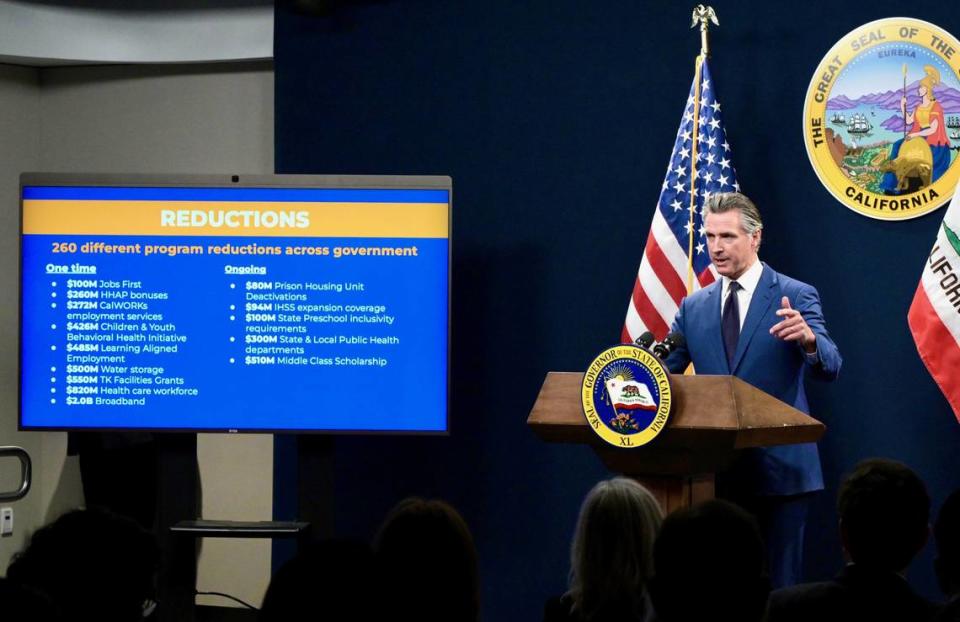California Gov. Gavin Newsom says he’s ‘against divestment’ after Sac State changes policy language
- Oops!Something went wrong.Please try again later.
While unveiling his revised $288 billion budget proposal Friday, California Gov. Gavin Newsom said he was “against divestment” amid the ongoing protests at several college campuses over the war in Gaza and a key demand that CSU and UC schools exit from Israel-tied investments.
The statement came three days after Sacramento State announced changes to its investment policy that would ensure it practices “socially responsible investment strategies which include not having direct investments in corporations and funds that profit from genocide, ethnic cleansing, and activities that violate fundamental human rights.” The revisions to the policy were presented to pro-Palestinian protesters on campus late Tuesday, who ended their encampment after eight days; a similar protest on UC Davis’ campus and at several other schools remain.
When asked, Newsom said that he had seen contradicting information “on Instagram” and from his policy advisors, and he told reporters to “ask us later this afternoon” for more details on his position regarding potential divestment.

The revisions make Sacramento State one of the first CSU campuses to alter their policies amid the ongoing war in Gaza, which has killed more than 34,000 Palestinians living in Gaza since Hamas attacked Israel on Oct. 7, killing more than 1,200 Israelis in the deadliest attack on Jews since the Holocaust.
The updates to Sac State’s policies, signed off on by university President Luke Wood, show a variety of changes.
It includes Sacramento State seeking its five auxiliaries to investigate its direct and indirect investments to follow the expanded guidelines. The five auxiliaries are the Associated Students, University Enterprises Inc., University Union, University Foundation at Sac State and Capital Public Radio.
Sacramento State noted in its policy that the University Foundation does not have “any direct investments” with corporations and funds that have ties to the Israeli military. The policy also has added sections denouncing genocide and supporting student’s peaceful activism.
Students for Justice in Palestine said teachers from the Faculty for Justice in Palestine will sit on Sac State’s finance committee to review any possible divestment.
“While many colleges and universities have been encouraged to take sides and embrace a binary approach to global issues, conflicts, and wars across the world, we at Sacramento State have intentionally pursued a third space in these conversations — specifically focused on leading with listening and love — and being intentional about what is within our control,” Wood said in a video message about the policy changes released Thursday night.
Student organizers across the 23-campus CSU system have taken different approaches to protests and occupations, but of those who have made demands, theirs are nearly identical: they all want university administrators to disclose any financial ties to Israel or Israeli companies and, if such financial ties exist, that the university divest from them.
Newsom had largely stayed on the sidelines of the debate that has embroiled campuses across the nation and has resulted in arrests and other police action at Cal Poly Humboldt and UCLA, as well as the private University of Southern California.
Friday’s remarks were the first public comments the Democrat made on divestment in the state-run schools, over which he has no direct control. The governor does hold ex officio roles on both UC’s Board of Regents and Cal State’s trustee board.
Earlier this month, Newsom weighed in on responses by law enforcement — including the California Highway Patrol — at some protests on campus and condemned the violence, saying those who engaged in illegal behavior at UCLA and elsewhere should be held accountable, “including through criminal prosecution, suspension or expulsion.”
In late March, Newsom called for a ceasefire in the Middle East, saying in a letter to the state’s Muslim, Palestinian and Arab communities that “I support President Biden’s call for an immediate ceasefire as part of a deal to secure desperately needed relief for Gazan civilians and the release of hostages. I also unequivocally denounce Hamas’s terrorist attack against Israel. It is time to work in earnest toward an enduring peace that will furnish the lasting security, autonomy, and freedom that the Palestinians and the Israeli people both deserve.”
In December, he sent a letter to university leaders, urging them to do more to quell threats of violence against students “targeted because of a Jewish, Arab, or Muslim identity.” He wrote that “some faculty have inflamed the discourse with violent rhetoric. This is unacceptable and demands action.”

